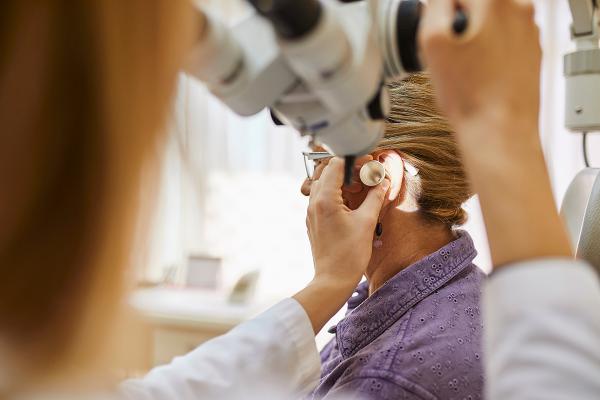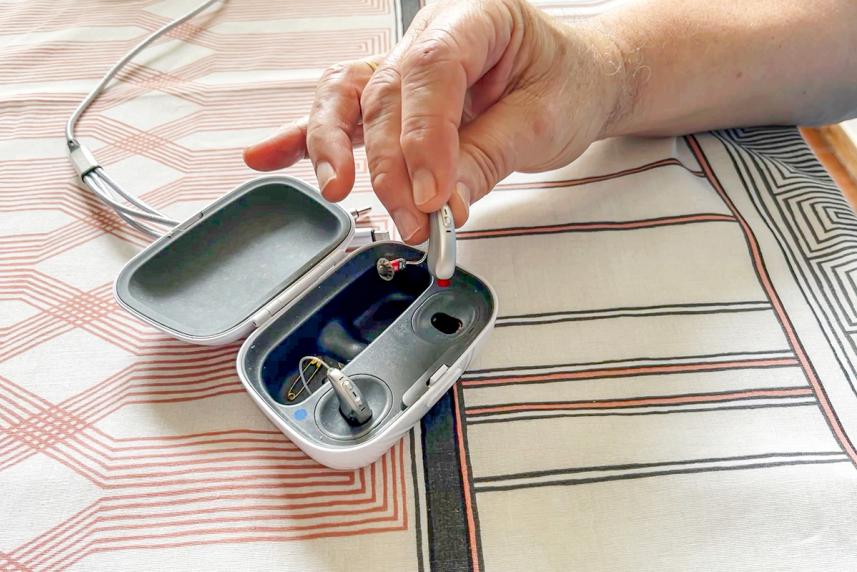
AARP Hearing Solutions helps members access hearing care professionals, no-cost hearing exams and more.
Get the inside scoop from hearing expert Monica Murray, Au.D., of UnitedHealthcare Hearing.

Many people start to notice hearing problems as they get older. And wearing hearing aids could make a big difference. Whether you’re new to the world of hearing aids or you’ve been wearing these devices for a while now, it’s normal to have some questions. In this series, an expert audiologist at UnitedHealthcare Hearing gives helpful advice about common concerns.
Sometimes I forget to charge my hearing aids overnight, and then I’m stuck the next morning. How can I make this a regular habit?
When you wake up in the morning, you want your hearing aids to be fully charged and ready to go. It can definitely throw you off when you forgot to put them in the charger the night before. The key to making this a nightly habit is consistency.
Most devices need to be charged overnight (about 3 to 4 hours) to reach their full capacity. That charge should last you all of the next day for normal usage.
Here are some ways to help make overnight charging part of your nightly routine — and what to do if you forget.

AARP Hearing Solutions helps members access hearing care professionals, no-cost hearing exams and more.
Pick a recharging spot and stick with it. I recommend keeping your hearing aid charger in the same place — somewhere you’ll see it each night as you get ready for bed. This could be on your nightstand or near your medications. Or maybe you put your hearing aid charger in the same spot where you charge your phone, such as a desk or dresser.
Just be consistent. Remove your hearing aids at the same time and in the same place each night and be sure to place them in the charger right away. Don’t leave them loose on a table or by the bathroom sink. Soon this will become part of your routine.
Set a reminder on your phone. Let’s say your normal bedtime is 10 p.m. Try setting a “Charge hearing aids” reminder on your phone that pings at 9:30 p.m. You could also put a sticky note as a reminder on your bathroom mirror or your bedside lamp.
Have a backup plan in case you do forget. What if you wake up in the morning and realize you didn’t charge your devices? Many chargers have a quick-charge feature, where you charge your devices for 30-45 minutes and get a little boost. That can give you enough power to go to an appointment or run errands.
Consider buying a portable charger. An on-the-go charger can be handy if you don't have full battery power in the morning. You don’t have to plug a portable charger into an outlet, and you can carry it in your bag. That means you can recharge your devices in your car, a coffee shop or other place away from home.
Be aware that increased streaming can impact your battery power. Do you tend to stream long audiobooks or hours of podcasts to your hearing aids? If so, your battery charge may run out sooner than a full day. This is another time when a portable charger can be helpful, especially if you’re traveling.
I’m talking about higher than normal streaming, though. For example, if you’re on a road trip and listening to an audiobook for 6 hours. Or if you’re on a plane or at the airport and you stream several movies.
Wipe down your devices each night. One final charging tip: It’s a good practice to wipe down your hearing aids with a tissue or soft cloth each night before you put them in the charger. This helps keep the contacts clean so your devices make a good connection inside the charger.
(As an AARP® member, you get a trial period and upfront pricing—plus you can select the level of care that fits your needs. Learn more.)
Meet the expert
Monica Murray, Au.D., is vice president of program development at UnitedHealthcare Hearing and a nationally recognized hearing health expert.
Information is for educational purposes only and is not a substitute for the advice of a licensed medical provider. Consult your provider prior to making changes to your lifestyle or health care routine.
AARP Hearing Solutions is available to all AARP members and does not require a health insurance plan from UnitedHealthcare. The AARP hearing program discount cannot be combined with any other discounts, promotions, coupons or hearing aid benefit plans unless noted herein. Products or services that are reimbursable by federal programs including Medicare and Medicaid are not available on a discounted or complimentary basis. AARP commercial member benefits are provided by third parties, not by AARP or its affiliates. Providers pay a royalty fee to AARP for the use of its intellectual property. These fees are used for the general purposes of AARP. Some provider offers are subject to change and may have restrictions. Please contact the provider directly for details. UnitedHealthcare Hearing is provided through UnitedHealthcare, offered to existing members of certain products underwritten or provided by UnitedHealthcare Insurance Company or its affiliates to provide specific hearing aid discounts. This is not an insurance nor managed care product, and fees or charges for services in excess of those defined in program materials are the member's responsibility. UnitedHealthcare does not endorse nor guarantee hearing aid products/services available through the hearing program. This program may not be available in all states or for all group sizes. Components subject to change.